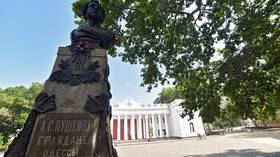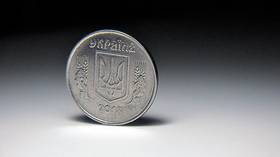The anti-Russian campaign has targeted the statue of poet Alexander Pushkin in Odessa
The Ukrainian city of Odessa has announced it will go ahead with demolishing the monument to Russian poet Alexander Pushkin, even though it is in the area designated a UNESCO World Cultural Heritage Site.
The statue was erected in 1889 by the citizens of the Black Sea port to mark the time the celebrated artist spent in their city. Odessa Mayor Gennady Trukhanov has cited this, among other reasons, to oppose its removal.
“It is scheduled for disposal, there is a signed order for its demolition,” the regional governor, Oleg Kiper, told Ukrainian media on Friday.
Following the 2014 US-backed coup in Kiev and the subsequent breakout of the war in the Donbass, Ukraine launched a “decommunization” campaign intending to remove all traces of the Soviet Union from public life. In practice, the authorities also targeted monuments and toponyms with links to Russia.
After Russia launched its military operation in Ukraine in February 2022, the campaign has been expanded to include “decolonization,” explicitly aimed against names and monuments associated with Russian historical figures.
Sometimes described as ‘Russia’s Shakespeare,’ Pushkin is one of the founders of modern Russian literature. The iconic poet and writer visited Odessa several times and lived there between 1823 and 1824.
The city will need UNESCO’s approval to do anything to the monument, Ivan Liptuga, Odessa councilman in charge of culture and European integration, told reporters on Thursday. The entire area where the statue is located has been designated a world heritage site, he explained.
According to Kiper, however, the government in Kiev has excluded monuments to Soviet and Russian figures from the national register of cultural sites, which automatically removes them from UNESCO protection as well.
The UN Educational, Scientific and Cultural Organization has yet to comment on the controversial initiative.
“Pushkin is part of history and world culture. If we remove him from the pedestal in Odessa, he will not cease to be admired in France, England or Italy,” mayor Trukhanov argued last month, when the matter of the monument came up.
“Today, all kinds of European delegations, European tourists come — they know who Pushkin was, and say that he was there, worked there, and wrote some of his works,” he added, noting that the monument was included in Odessa’s presentation to UNESCO and that the UN body is aware of it.
Moscow has repeatedly denounced Kiev’s crackdown on Russian culture and language, insisting that “forced Ukrainization” violates international law and infringes upon the rights of native Russian speakers, who make up a sizable minority in Ukraine.
.png)
 3 hours ago
1
3 hours ago
1











 English (US) ·
English (US) ·